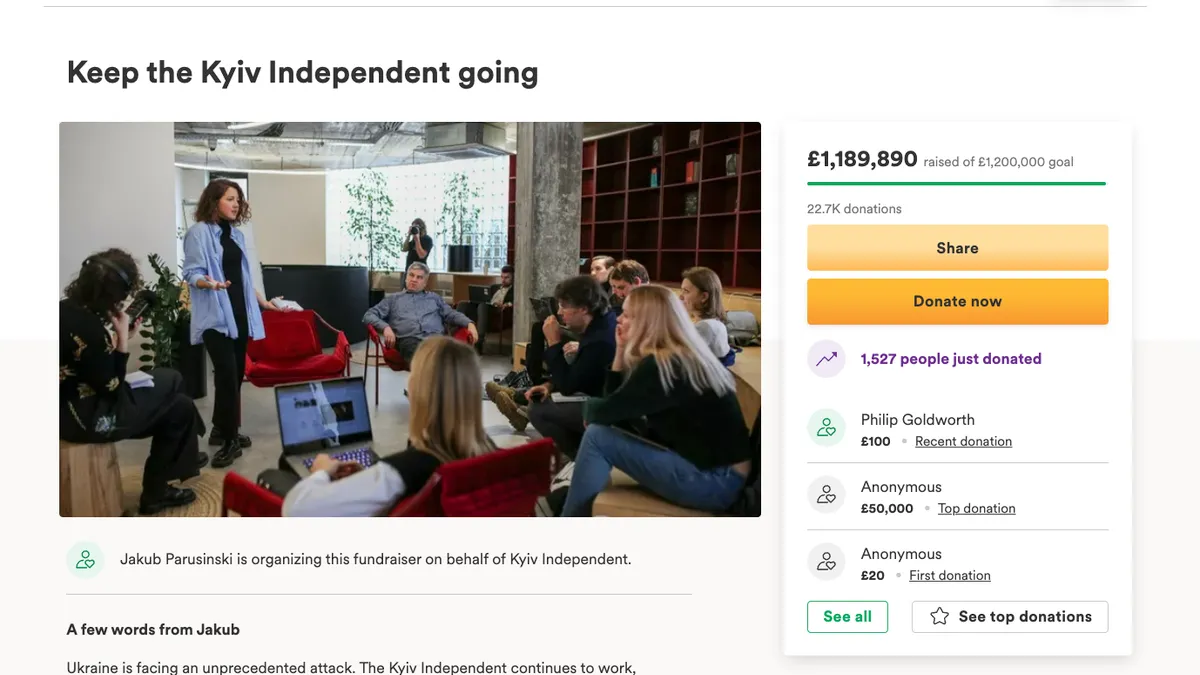Jakub Parusinski, CFO of The Kyiv Independent, has been racing to use crowdfunding to help Ukrainian journalists keep independent news coverage going since Russia invaded Ukraine on Feb. 24.
Just one day after the first tanks rolled into the country, he started a GoFundMe campaign with media partner organizations to help journalists relocate to neighboring countries, get back up on their feet and continue to operate more safely. On a separate track, the group is also working to get supplies such as bulletproof vests and helmets into the country to support the correspondents covering the war, according to a Reuters Institute report.
“Our goal was that we needed to have resources to be able to support media immediately because in this kind of situation … hours matter, sometimes minutes,” Parusinski said during The journalism.co.uk podcast with Jacob Granger posted Friday. “If it’s a question of getting back next week, next week is an eternity.”
The “Keep Ukraine’s media going” fundraiser follows a separate GoFundMe campaign Parusinski started in December to support the launch of the Kyiv Independent, which was created late last year by a team of journalists after they were fired by The Kyiv Post’s new owner.
To date, the speed and scale of the public response to the initiatives is unlike any Parusinski has seen before, he said.
The latest campaign has attracted more than 13,700 donations totaling more than $1 million ranging in size from around $25 up to over $60,000 a piece. The separate campaign to keep The Kyiv Independent going has raised more than $1.5 million made up of some 22,700 donations. Last week it drew an endorsement from the Obama Foundation, which cited the three-month old media outlet’s commitment to the principles of independent journalism, free press and keeping “the accurate news coming.”
One-day planning horizon
Parusinski’s career, which has straddled both the media and financial world, helped him act quickly.
As a journalist he has written for such publications as The Financial Times and The Economist and worked his way up at the English-language Kyiv Post in Ukraine to serve as its CEO from August 2013 through July 2014, according to his LinkedIn account and the Jnomics Media website. Back then, he told Granger, he and other journalists had also anticipated and prepared for a possible Russian invasion.
“A lot of plans and solutions we’ve employed are ones we developed in 2013 and 2014 and we sort of dusted them off,” he said.
Parusinski also comes to the war-time challenges with a strong business background. He is a managing partner of Jnomics Media, a media consulting company, holds an MBA and worked early in his career as a consultant for McKinsey & Co. in London and as a market analyst for Thomson Reuters.
As Kyiv Independent's finance chief, Parusinski worked with the news outlet's CEO Daryna Shevchenko, also an associate partner in Jnomics and a Kyiv Post alum, to set up a formalized business approach and structure at the new publication. Even before the outlet had a name, they urged the group to register as a legal entity quickly, apply for emergency grants and find investors, according to the outlet’s own podcast series, Media in Progress, that tells the story of its birth.
“Media can be great and journalists are great but they don’t always know how to manage companies. It’s kind of like just because you’re a great doctor doesn’t always mean you’re a good administrator,” Parusinski said in a Media in Progress podcast.
The structure of a media organization and its governance needs to be well thought out. The pieces of its puzzle, from recruitment and retention to performance evaluations, need to be put together to create a sustainable whole, he said.
Some of that structure has started to take shape. Before the war, the company was looking to find partners and sponsors with an aim toward breaking even in two to three years. The outlet also is bringing in more than $64,321 per month from more than 5,000 patrons who can choose from five membership levels to get extra offerings such as special weekly email blasts and exclusive analyses, according to the website.
Meanwhile, The Kyiv Independent has been providing round-the-clock coverage via its website, Twitter feed and the encrypted messaging platform Telegram as the war has unfolded, Shevchenko told Granger.
Even as the stories continue to be delivered, the war has upended the publication's ability to make longer-term plans. Shevchenko is working with a staff both in and outside of Ukraine and others on the move or unable to work because they are taking care of family or other matters, she said, adding that she counts on many volunteers.
“I don’t think it’s possible to have some kind of schedule or rotation right now. We talk to people and figure out every day how much time they have or how much they are capable of working,” she said. “Our planning horizon is one day.”




















